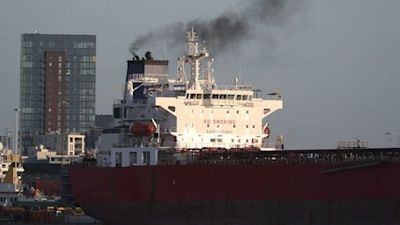What we know about the Special Boat Service - the elite operatives behind the Nave Andromeda raid

Video report by ITV News Correspondent Martha Fairlie
The unit thought to be behind the raid on an oil tanker off the Isle of Wight is the highly covert British defence unit, the Special Boat Services (SBS).
Operations by the SBS are highly classified and not officially confirmed by the Ministry of Defence.
Here's what we know about the elusive military unit.
What is the Special Boat Service?
The SBS is an elite maritime counter-terrorism unit of the Royal Navy tasked to deal with incidents at sea.
Most of its personnel are Royal Marine Commandos and the unit is part of the UK's special forces. It is the Royal Navy's answer to the Special Air Service (SAS). Its motto is: 'Not by strength, by guile'.
The Ministry of Defence refuses to say how many fighters it comprises of. The unit is based in Poole, Dorset, only a few miles from where the stricken Nave Andromeda was when the raid took place.
What capabilities does the SBS have?
The Ministry of Defence (MOD) says the unit specialises in "daring undercover raids that exploit the element of surprise."
Operatives are trained to seize control of ships, tankers or rigs, typically by fast-roping down from helicopters.
Recruits go through a similar gruelling selection process as the SAS but acquire additional specialisms in underwater reconnaissance and demolition, canoeing and diving.
On its website, the Royal Navy describes SBS personnel as the "most elite and capable soldiers in the entire British military".
It added: "All show exceptional physical and mental aptitude. In short, they’re the best of the best."
What is recruitment like?
According to SOFREP, the military news website, there is a joint selection process for both the SAS and SBS.
It includes a three-week endurance exercise in the Brecon Beacons and Black Hills of South Wales culminating in a 40-mile while carrying a 55-pound Bergen rucksack.
Stage two is jungle training in Belize learning to patrol in harsh conditions. Those who make it through that stage go on to the third phase of escape, evasion and tactical questioning. For this, they are instructed to make their way to a series of locations in three days without being captured by a hunter force before reporting for a gruelling tactical questioning assessment.
SOFREP says that out of an average of 125 candidates, approximately 10 recruits will make it through the process.
When was the SBS formed?
The SBS was formed at the height of the Second World War. It was believed to have been the first British unit to enter Athens in 1944 after its liberation from German troops.
According to the National Army Museum, its origins go back to several units that undertook raids, sabotage and reconnaissance from small boats, canoes and submarines during the war. The units included the Royal Marines Boom Patrol Detachment, the Army Commando's Special Boat Section and the Combined Operations Pilotage Parties.
It was disbanded after the war but personnel were absorbed into the Royal Marine's Combined Operations Beach and Boats Section (COBBS) which was formed in 1947. It formed a new Special Boat Section the following year.
The SBS has had several name changes over the years. In 1951, it was called the Special Boat Company before changing to the Special Boat Squadron in 1974. It took its current name in 1987.
In 1972, when the unit parachuted into the Atlantic to board the Queen Elizabeth II passenger liner following a bomb scare, it was given the maritime counter-terrorism role with responsibility for protecting ports, ferries, cruise ships and oil platforms.
What missions involving the SBS do we know about?
In a similar incident to the Nave Andromeda incident, SBS operatives were airlifted on to a cargo ship in the Thames Estuary in December 2018 when stowaways ran amok.
According to the National Army Museum, the SBS has carried out missions in a number of British interventions.
In the Korean War, it conducted sabotage missions along the Korean coast, launching raids from submarines and warships that damage the North Korean and Chinese lines of supply and communications.
In the Falklands War, it carried out covert reconnaissance weeks ahead of the arrival of the main task force and helped clear enemy troops from San Carlos Bay the night before the main landings.
In the Gulf War of 1990, it helped search and destroy mobile scud missiles, sabotage the Iraqi fibre optics communications network and secure the British Embassy in Kuwait.
One of its most famous recruits, the former Liberal Democrat leader Paddy Ashdown served with the SBS in Borneo in the 1960s.
It has also conducted missions in Sierra Leone, Iraq and Afghanistan.
In 2012, the SBS provided security during the London 2012 Olympic and Paralympic sailing competitions.
Why is it so secretive?
Most operations conducted by the SBS are highly classified and the British government or the MOD rarely comment on them, as the operations involve national security.
The SBS is split up into three groups - C, M and S Squadrons. C Squadron is responsible for swimmer and canoe operations. S Squadron specialises in small water borne craft and mini-sub operations.M Squadron is responsible for maritime anti-terrorism and ship boarding operations and within it is the Black Group - a counter-terrorist team that uses helicopter-borne assaults.